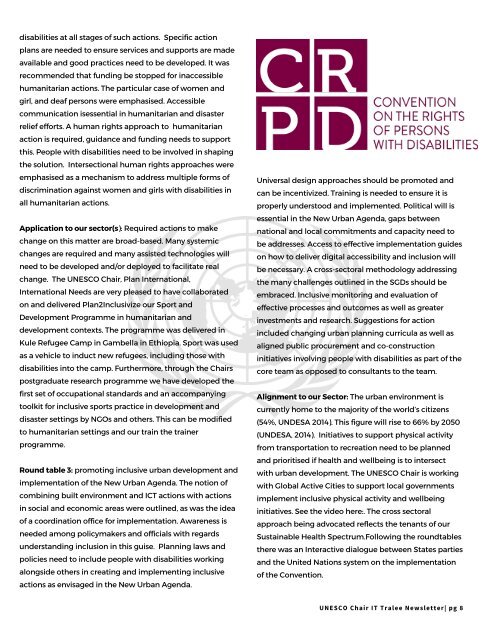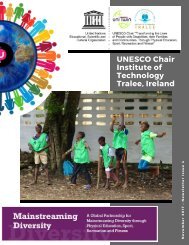Issue 4 Nov 2017 merged
Create successful ePaper yourself
Turn your PDF publications into a flip-book with our unique Google optimized e-Paper software.
disabilities at all stages of such actions. Specific action<br />
plans are needed to ensure services and supports are made<br />
available and good practices need to be developed. It was<br />
recommended that funding be stopped for inaccessible<br />
humanitarian actions. The particular case of women and<br />
girl, and deaf persons were emphasised. Accessible<br />
communication isessential in humanitarian and disaster<br />
relief efforts. A human rights approach to humanitarian<br />
action is required, guidance and funding needs to support<br />
this. People with disabilities need to be involved in shaping<br />
the solution. Intersectional human rights approaches were<br />
emphasised as a mechanism to address multiple forms of<br />
Universal design approaches should be promoted and<br />
can be incentivized. Training is needed to ensure it is<br />
discrimination against women and girls with disabilities in<br />
all humanitarian actions.<br />
properly understood and implemented. Political will is<br />
essential in the New Urban Agenda, gaps between<br />
Application to our sector(s): Required actions to make<br />
national and local commitments and capacity need to<br />
be addresses. Access to effective implementation guides<br />
change on this matter are broad-based. Many systemic<br />
changes are required and many assisted technologies will<br />
on how to deliver digital accessibility and inclusion will<br />
be necessary. A cross-sectoral methodology addressing<br />
need to be developed and/or deployed to facilitate real<br />
change. The UNESCO Chair, Plan International,<br />
the many challenges outlined in the SGDs should be<br />
embraced. Inclusive monitoring and evaluation of<br />
International Needs are very pleased to have collaborated<br />
on and delivered Plan2Inclusivize our Sport and<br />
effective processes and outcomes as well as greater<br />
investments and research. Suggestions for action<br />
Development Programme in humanitarian and<br />
development contexts. The programme was delivered in<br />
included changing urban planning curricula as well as<br />
aligned public procurement and co-construction<br />
Kule Refugee Camp in Gambella in Ethiopia. Sport was used<br />
as a vehicle to induct new refugees, including those with<br />
initiatives involving people with disabilities as part of the<br />
core team as opposed to consultants to the team.<br />
disabilities into the camp. Furthermore, through the Chairs<br />
postgraduate research programme we have developed the<br />
first set of occupational standards and an accompanying<br />
Alignment to our Sector: The urban environment is<br />
currently home to the majority of the world’s citizens<br />
toolkit for inclusive sports practice in development and<br />
disaster settings by NGOs and others. This can be modified<br />
(54%, UNDESA 2014). This figure will rise to 66% by 2050<br />
(UNDESA, 2014). Initiatives to support physical activity<br />
to humanitarian settings and our train the trainer<br />
programme.<br />
from transportation to recreation need to be planned<br />
and prioritised if health and wellbeing is to intersect<br />
with urban development. The UNESCO Chair is working<br />
Round table 3: promoting inclusive urban development and<br />
implementation of the New Urban Agenda. The notion of<br />
with Global Active Cities to support local governments<br />
combining built environment and ICT actions with actions<br />
implement inclusive physical activity and wellbeing<br />
initiatives. See the video here:. The cross sectoral<br />
in social and economic areas were outlined, as was the idea<br />
of a coordination office for implementation. Awareness is<br />
approach being advocated reflects the tenants of our<br />
Sustainable Health Spectrum.Following the roundtables<br />
needed among policymakers and officials with regards<br />
understanding inclusion in this guise. Planning laws and<br />
there was an Interactive dialogue between States parties<br />
and the United Nations system on the implementation<br />
policies need to include people with disabilities working<br />
alongside others in creating and implementing inclusive<br />
of the Convention.<br />
actions as envisaged in the New Urban Agenda.<br />
U N E S C O C h a i r I T T r a l e e N e w s l e t t e r | p g 8




